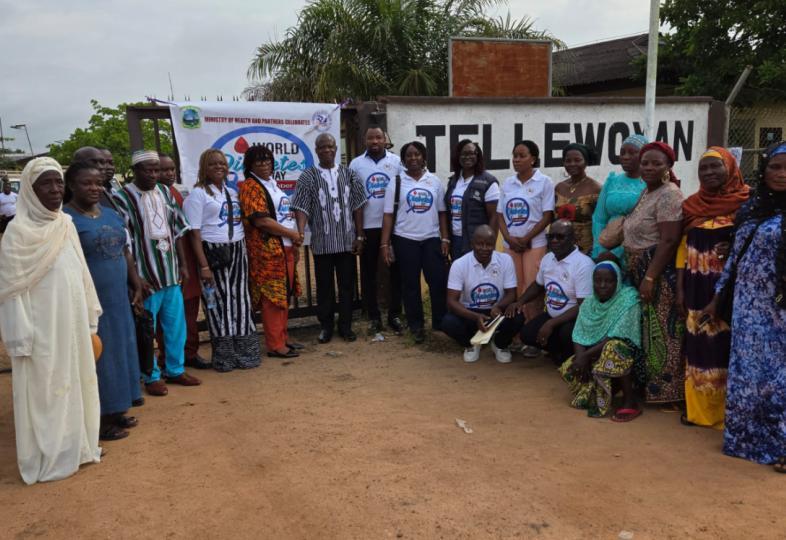Africa-Press – Liberia. The Government of Liberia has taken a major step toward expanding specialized healthcare services with the launch of the PEN-Plus scale-up program in Bong and Lofa Counties.
The initiative, implemented by the Ministry of Health in partnership with the Clinton Health Access Initiative and the World Health Organization, aims to decentralize the management of severe chronic illnesses and ensure that lifesaving care becomes accessible even in remote communities.
The launch events in both counties brought together senior government officials, development partners, health workers, civil society groups, and local leaders who described the program as a long-awaited intervention that will directly improve the lives of people suffering from severe non-communicable diseases.
The PEN-Plus strategy strengthens local hospitals to diagnose and manage complex illnesses requiring continuous care, including type one diabetes, sickle cell disease, advanced heart disease, and other chronic conditions.
Speaking at the events, Jamesetta Smith, Director of the Non-Communicable Diseases and Injuries Unit at the Ministry of Health, outlined the growing threat non-communicable diseases pose globally and within Liberia.
She said more than forty million people die each year from these conditions worldwide, with the majority of deaths occurring in low and middle income countries like Liberia. Smith explained that from 2019 to 2023 the country recorded over forty-nine thousand cases of non-communicable diseases and more than five thousand related deaths, though actual figures are likely higher because many deaths occur outside health facilities.
Smith pointed to unhealthy dietary habits, low physical activity, increasing alcohol consumption, unmanaged stress, and other lifestyle factors as key risk factors contributors to the rising burden of NCDs diseases.
She said the PEN-Plus model equips mid-level health workers with the skills needed to manage chronic and severe NCDs in rural and peripheral urban settings, working closely with medical specialists.
Smith added that Liberia has now entered a national scale-up phase after initial implementation in Bomi County and is committed to expanding access to specialized care in all regions.
The Bong County Superintendent, Lorleyah Norris, praised the launch of the program and said it represents a critical investment in the health and future of the county’s residents. She said the burden of chronic diseases has been felt deeply in communities where families struggle to access diagnosis and long-term care.
In her words, residents of Bong have waited for an initiative that brings hope closer to home, and the PEN-Plus program will open a new chapter in both prevention and treatment efforts. She added that local authorities will ensure community cooperation, outreach, and support to help the program succeed.
Lofa County Superintendent J Lavelah Massaquoi also welcomed the launch and said the introduction of PEN-Plus services at Tellewoyan Memorial Hospital will provide relief to families who have been traveling long distances to seek specialized care.
He said the program signals the government’s recognition of health as a fundamental right for people in all counties and not just those living near major medical centers.
Massaquoi emphasized that the county administration will continue working closely with health partners to promote awareness, encourage residents to seek testing, and support early detection and long-term disease management.
CHAI Country Director, Moses Massaquoi, described the launch as a major milestone in Liberia’s quest for equitable access to care. He said the PEN-Plus model is grounded in equity, innovation, and resilience and transforms the capacity of county hospitals to manage severe chronic illnesses that were previously treatable only at national referral facilities.
He spoke about CHAI’s longstanding partnership with Liberia, dating back to 2006 when the organization first helped strengthen the post-war health system. Massaquoi said CHAI collaborated with the Ministry of Health and the Bong County Health Team to prepare C B Dunbar Hospital for the PEN-Plus rollout by conducting facility assessments, training staff, recruiting additional workers, and improving supply chain readiness. He underscored the need for continuous investment to ensure sustainability and thanked partners for their dedication and collaboration.
Representing the WHO Office in Liberia on behalf of WHO Representative Dr Olushayo Olu, a staff of WHO, Yatta Sackie Wapoe described the launch as an important milestone that creates new possibilities for individuals and families facing chronic conditions.
She said illnesses such as severe hypertension, sickle cell disease, type one diabetes, and rheumatic heart disease continue to place pressure on households and the healthcare system. She emphasized that the PEN-Plus strategy moves Liberia toward a more proactive and integrated approach that brings lifesaving services closer to those who need them most.
She reaffirmed WHO’s commitment to supporting training, increasing access to essential care, and strengthening the sustainability of the initiative as part of Liberia’s long-term national health strategy.
She added that the PEN-Plus clinics will serve as training centers for health workers and will expand the country’s capacity to manage complex chronic diseases. She thanked the Ministry of Health, CHAI, Partners in Health, donors, and local health teams for their contributions and said the launch marks the beginning of a long-term commitment to strengthening Liberia’s health system.
Launching the PEN-Plus program in both counties, Assistant Minister for Prevention Services Dr Caullau Jabbeh Howe said the Ministry’s decision aligns with a broad regional mandate urging African nations to adopt the PEN strategy to address the rising burden of chronic illnesses.
She described severe non-communicable diseases as silent killers that often develop unnoticed until they become life-threatening. Dr Howe called on communities, partners, and local leaders to work collectively to improve health outcomes and commended women’s groups for their leadership in spreading health awareness.
Dr Howe also announced that the Ministry will launch the HPV vaccination campaign next week to protect children aged nine to eighteen from cervical cancer, a disease she said continues to pose a major threat to the lives of Liberian women.
She urged parents to grant consent for their children to be vaccinated and reminded communities that strong health systems require both access to services and proactive public participation. She reaffirmed the Ministry’s commitment to ensuring that the PEN-Plus program becomes a sustained national service that improves the lives of people living with chronic illnesses.
With the introduction of PEN-Plus clinics in Bong and Lofa counties, Liberia has taken another important step toward strengthening its health system and prioritizing chronic disease care. Officials expressed confidence that expanding screening, early detection, and long-term management services will improve life expectancy, reduce preventable deaths, and create a healthier future for communities across the country.
For More News And Analysis About Liberia Follow Africa-Press






